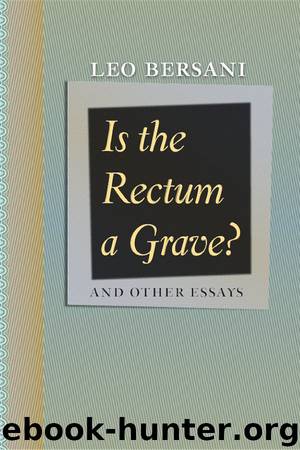Is the Rectum a Grave? by Leo Bersani

Author:Leo Bersani
Language: eng
Format: epub
Publisher: University of Chicago Press
Distinctions between ideas are perhaps grounded in assumptions of a difference of being between the self and the world. In demonstrating the mind’s resources for erasing that distinction, psychoanalysis understandably has difficulty articulating its concepts, keeping some space between them. For Freud, this meant holding on, for dear intellectual life, to dualisms he himself recognised as fragile. Their terms may constantly be collapsing into one another—sadism into masochism, the nonerotic into the erotic, even, as Jean Laplanche has demonstrated, the death drive into sexuality—and yet Freud continued to insist, to insist all the more tenaciously, on the validity of his dualisms. “Our views,” he writes in Beyond the Pleasure Principle, “have from the very first been dualistic, and today they are even more definitely dualistic than before.” The logical incoherence that results from the breakdown of conceptual distinctions accurately represents the overdetermined mind described by psychoanalysis. For over-determination, far from being merely a characteristic of primary process thinking, defines the psychoanalytic mind—that is, the mind that has renounced none of its interpretations of the real.
This also is an oceanic phenomenon—not exactly, however, the “limitless narcissism” of the self everywhere present in the world, but rather that of the world entirely reformulated as the self. The distinction, which may appear tenuous, is actually of the greatest importance, for what I take to be to be psychoanalysis’s most serious limitation is precisely the difficulty it has imagining that we can find ourselves already in the world—there not as a result of our projections but as a sign of the natural extensibility of all being. This is the presence to which art—not psychoanalysis—alerts us. I have recently been interested—especially in the work done with Ulysse Dutoit—in tracing the communication of forms in art as the affirmation of a certain solidarity in the universe, a solidarity we must perhaps first of all see not as one of identities but rather of positionings and configurations in space. The narcissistic pleasure of reaching toward our own ‘form’ elsewhere has little to do with the flood of an oceanic, limitless narcissism intent on elimating the world’s difference. Rather, it pleasurably confirms that we are inaccurately replicated everywhere, a perception that may help us, ultimately, to see difference not as a trauma to be overcome but as the nonthreatening supplement to sameness. Psychoanalysis profoundly describes our aptitude for preserving the world as subjectivity. Even the metonymic excesses of desire in Lacan are not the result of self-accretion through what might be called the accurate perception of inaccurate self-replications. Rather, Lacanian desire’s excess is a function of misregonition; constantly confusing the objects of our desires with their cause, we multiply desires in a hopeless effort to rejoin a retroactively fantasised lost “true” object of desire—thus remaining faithful, in an even more desperate version of fidelity to the past than the more literal Freudian one, to a lost nothingness. Art gives us a model of the world as world, one we ‘know’ as aesthetic subjects thrown outwards, ‘defined’ by relations that at once dissolve, disperse and repeat us.
Download
This site does not store any files on its server. We only index and link to content provided by other sites. Please contact the content providers to delete copyright contents if any and email us, we'll remove relevant links or contents immediately.
| African-American Studies | Asian American Studies |
| Disabled | Ethnic Studies |
| Hispanic American Studies | LGBT |
| Minority Studies | Native American Studies |
Cecilia; Or, Memoirs of an Heiress — Volume 1 by Fanny Burney(32558)
The Great Music City by Andrea Baker(32019)
Cecilia; Or, Memoirs of an Heiress — Volume 2 by Fanny Burney(31956)
Cecilia; Or, Memoirs of an Heiress — Volume 3 by Fanny Burney(31942)
We're Going to Need More Wine by Gabrielle Union(19046)
All the Missing Girls by Megan Miranda(16029)
Pimp by Iceberg Slim(14508)
For the Love of Europe by Rick Steves(14121)
Bombshells: Glamour Girls of a Lifetime by Sullivan Steve(14076)
Talking to Strangers by Malcolm Gladwell(13370)
Norse Mythology by Gaiman Neil(13366)
Fifty Shades Freed by E L James(13243)
Mindhunter: Inside the FBI's Elite Serial Crime Unit by John E. Douglas & Mark Olshaker(9344)
Crazy Rich Asians by Kevin Kwan(9292)
The Lost Art of Listening by Michael P. Nichols(7506)
Enlightenment Now: The Case for Reason, Science, Humanism, and Progress by Steven Pinker(7314)
The Four Agreements by Don Miguel Ruiz(6765)
Bad Blood by John Carreyrou(6622)
Weapons of Math Destruction by Cathy O'Neil(6281)
